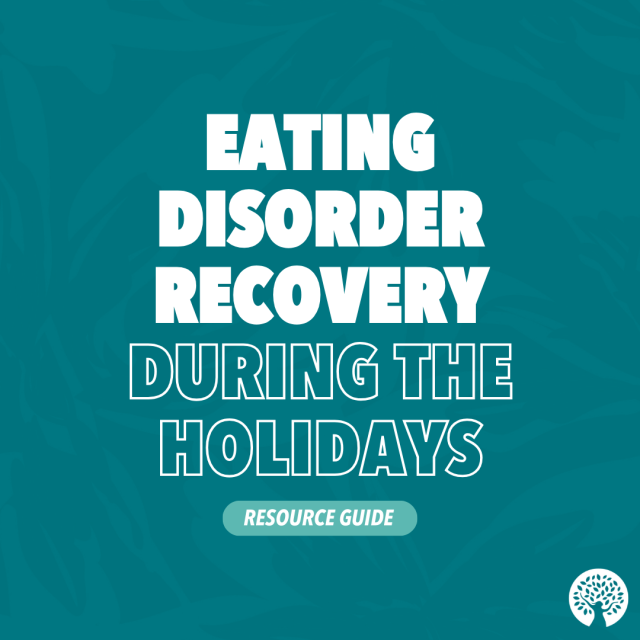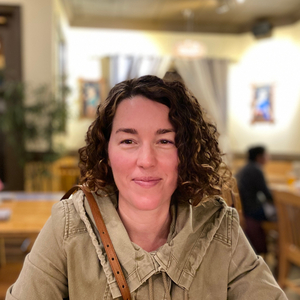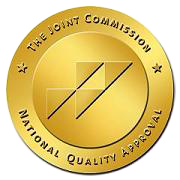Eating Disorders and the Holidays: 9 Tips to Help You Manage Triggers
By Britt Berg, M.S.

Find holiday eating disorder recovery tips here, including insights from experienced eating disorder therapists.
Tip 1: Know how to respond to eating disorder triggers.
Let’s face it. The holidays bring increased stress for many of us. Since stress can increase eating disorder thoughts and behaviors, we invite you to think about how you will manage possible triggers at holiday gatherings this year. Think about how will you respond or react to:
- Tables filled with seasonal fare
- Food-centric gatherings with friends and family
- Juggling a hectic schedule packed with holiday events
Triggers like these can evoke anxiety and strong emotional responses in anyone, especially those who are struggling with an eating disorder.
Tip: Check in with your therapist or dietitian before the holidays get started, if possible, and discuss how you will manage potential triggers. If you want to connect with others who understand, feel free to drop into our ongoing virtual eating disorder support groups.
Tip 2: Practice being present in the moment.
It’s easy to obsess about past holidays and worry about future gatherings, but these thoughts keep us from connecting with our current thoughts and feelings. The remedy? Stay present in the moment. If this sounds difficult, know that staying present in each moment becomes easier when practiced regularly. Try one or more of these simple mindfulness practices when you have a few moments to relax.
- Count your breathing. Close your eyes and pay attention to your breath, with an inhale and exhale counting as a single breath. Notice when your mind wanders, bring your attention back to your breath and begin again at one.
- Quash negativity. Notice when a negative thought enters your mind. Take a moment to stop, notice that it is just a thought and realize that—like the song you don’t want to listen to that pops up in your head—letting it be there and not attending to it is your best strategy.
- Observe your surroundings. When you’re feeling flustered, or at regular intervals during the day, take a full minute to focus on a natural object -- your house plant or a tree outside your window, for example. Take in the beauty and energy of nature for as long as your concentration allows.
- Self-soothe and distract. Splash cold water on your face or put a frozen rag on the back of your neck. Practice paced breathing to relax (drawing out your exhale) or do progressive muscle relaxation while breathing from your diaphragm. The physiological response helps to ground us and bring us back to a state in which mindfulness is possible.
- Create a grounding kit and take it with you to holiday events. Stock the kit with various calming items that that help you connect with your senses, such as mints, lavender oil and a favorite stone. Clear your mind and take notice of the taste, scent and feel of the objects.
Tip 3. Align your thoughts and behaviors with your values.
This holiday season, do what matters to you. Think about your core values; what in your life is most important to you? By knowing what’s important to you, and aligning your thoughts and behaviors with your values, it is easier to focus on what will help get you there (including what you will do and where you will spend your time during the holidays). Values help us explore who we are and what’s important and meaningful to us. In a sense, values are like glue that binds the tiniest actions to the biggest long-term goal. When our values are clear, we can identify the committed action that is necessary to move us in the direction we want to go.
Take action: Try this therapeutic eating disorder recovery activity.
Tip 4. Draw on the principles of ACT.
The principles of acceptance and commitment therapy (ACT) -- many of which are listed here in this blog -- can help you create a rich and meaningful life while accepting the waves that inevitably come in life. ACT is all about helping you create a valued life even in the presence of negative thoughts and feelings. And what better time to work on that than the holidays?
- A: Accept your thoughts and feelings, and be present (“I accept that my holiday does not have to be perfect” or “I accept that my recovery may not be perfect during the holidays”).
- C: Connect with your values. As you’re looking at how to spend your time this holiday season, focus on what is truly valuable to you and what gives your life meaning (“I value honesty” or “I value meaningful connections with the people I love”).
- T: Take effective action that aligns with your values. Spend your time doing things that are meaningful to you, and don’t feel obligated to engage in events, pastimes or traditions because you think you should or because others insist it is important (“I am willing to practice direct communication” or “I will not spend time with my loved one who gives unsolicited advice and dismisses my feelings”).
Tip 5. Talk about painful feelings with those you trust.
Have you been able to open up to anyone lately? The holidays can sometimes give rise to our deepest painful feelings. When that happens, we may try everything we can do to get rid of or avoid those uncomfortable feelings. If you are working with a therapist, ask them about skills to help you confront these emotions -- not changing the feelings themselves, but changing your relationship to them. You can learn how to make room for unpleasant feelings and sensations instead of trying to suppress them or push them away.
Tip: If you don’t have a therapist currently, feel free to join our new 6-week holiday season eating disorder support group series where you can learn how to practice these skills.
Tip 6. Manage your expectations.
The fear of missing out is real, and it’s okay to feel however you do about attending or skipping events this holiday season. Unfortunately, the world does not stop spinning and you can probably expect to run into at least a few challenges over the holidays. Ask yourself:
- How will I approach plating my meals?
- How will I deal with conflict between family members?
- What if things don’t go as planned?
- What if I want to cancel an event at the last minute?
- Who can I talk to about these hard feelings?
Prepare for the unexpected by practicing acceptance and making peace with the fact that the holidays will look different this year. Keep your expectations realistic and keep wellness as a priority.
Tip 7. Consider family therapy.
There are many ways for family members and loved ones to learn how to support you in your healing, including during the holiday season. You can start by letting them know what is helpful to you, and identify someone to be your support person at each gathering in case you need extra support in the moment.
Consider: Sharing a link to our eating disorder support groups for family members and friends.
Tip 8. Address lingering trauma.
Studies show that as many as one in four people with eating disorders may be negatively affected by past trauma [1]. While time spent with family members can be supportive for many people, being around family can dredge up memories of past trauma, including childhood emotional, physical or sexual abuse. If you’re already working on trauma with a trained therapist, stay in touch with your therapist as the holidays approach and have a plan in place for how you will respond to triggers. If you haven’t started working on healing past trauma in therapy, we encourage you to explore resources that can help you manage difficult emotions and address ongoing emotional pain, relationship dysfunction and other challenges. An experienced trauma therapist or a group treatment setting may help you learn how to change your relationship to past trauma so that it does not take over your life. Psychoeducation, anxiety management and exposure work, along with acceptance, can all go a long way to helping you engage with family without feeling ruled by past trauma.
Read: The link between eating disorders and PTSD.
Tip 9. Consider virtual eating disorder treatment.
Yes, you can take recovery home for the holidays. A virtual intensive outpatient program (IOP) can offer a bridge to recovery this holiday season. Eating Recovery At Home and Pathlight At Home, our virtual IOPs for eating disorders and mood and anxiety disorders, offer the same quality care as our in-person treatment but from the comfort and privacy of your own home. With so much to juggle during the holidays, this can serve as a convenient option for those seeking intensive outpatient care, taking the commute and other logistics out of what can be an already chaotic season. Our virtual programs are covered in-network by most commercial insurance plans. By taking recovery home for the holidays through our virtual programming, you have a community of people who understand what you are going through, and you’ll start building resilience and skills you can practice in real time as you navigate holiday stressors.
A special note to those in eating disorder treatment this holiday season
As with many of our biggest life decisions, there is never a truly “convenient” time to enter eating disorder treatment and the holiday season can feel like an especially complicated time to do so. Entering treatment and working toward recovery is a gift you give to your future self, along with all the memories that you will make at future celebrations with loved ones. If you are going to be spending the holidays in a treatment center, be willing to try new traditions. For example:
- Find a way to connect with family and friends in a meaningful way despite the distance.
- Write snail mail holiday cards to your loved ones.
- Watch your favorite holiday movie (or one you’ve never seen before).
- Get a holiday-themed coloring book for cozy crafting.
- Put up decorations or go look at holiday lights.
- Process the feelings you may have about spending the holidays in treatment. Name your feelings and bring them up with your therapist or in a group session.
- Remind yourself why you made the decision to start treatment. Have faith that on future holidays you will be celebrating a new milestone in recovery.
- Allow yourself to grieve. Yes, your holidays may look different, but you can find meaningful connections and community wherever you may be.
Depending on the level of care you are in, you can suggest doing these as experiential outings or you can do them during your time away from treatment. Your care team is also likely to have holiday-themed activities planned.
A special note for families and caregivers
We invite you to be involved in your loved one’s eating disorder recovery. You can get started by reviewing our eating disorder resources for families or dropping in to one of our eating disorder support groups for friends and family members.
Looking for more eating disorder recovery tips?
- Read our guide to eating disorder recovery during the holidays here.
- Find our Thanksgiving eating disorder recovery guide here.
- View our guide to mental health during the holidays here.
- Get 10 mental health tips for the holidays here.
- Find 40 eating disorder recovery tips for tough days here.
Clinically reviewed by Maggie Moore, MA, LMFT October 27, 2023. Special thanks to Bonnie Brennan, MA, LPC, CEDS for contributing numerous clinical insights to this piece.
Sources
Struggling with an eating disorder?
One conversation can make all the difference. Connect with us today.
Get Help NowConnect With Us




